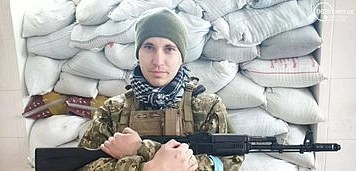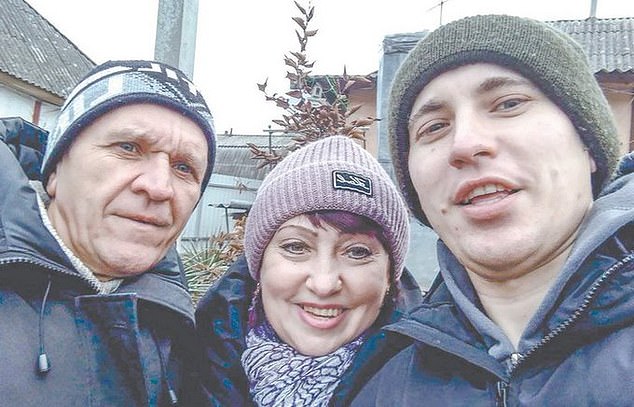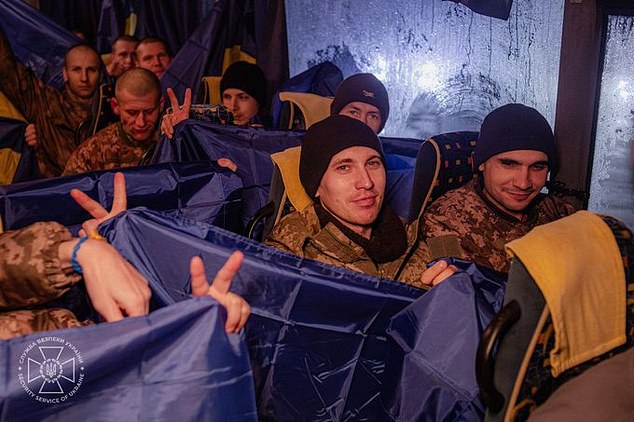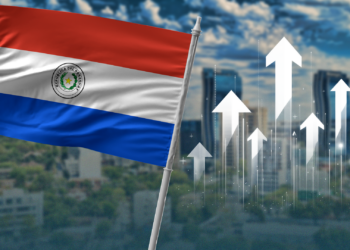A Ukrainian prisoner of war who was held captive in Russian jail for 1,000 days has revealed how he survived the constant hunger and endless beatings.
Journalist Oleksandr Gudilin was captured by Russian soldiers on April 12, 2022 during the siege of Mariupol.
The three month-long siege began on February 24 of that year and led to the death of a reported 25,000 Ukrainian civilians.
The 34-year-old was taken from his hometown by Russian soldiers and spent 1,000 days inside the horrors of the Russian penal system.
Since Mariupol remains under Russian occupation, Gudilin is currently based in Vinnytsia in central Ukraine while he undergoes rehab.
But the traumas of his imprisonment remain with him.
‘There are periods of time that my memory has completely blanked out, and I don’t understand why,’ he told The Times.
‘But there are also other times, often moments of extreme stress or emotion, that my memory has recorded with vivid precision.’

Oleksandr Gudilin, 34, a journalist from Mariupol, joined Ukraine’s Territorial Defence Forces six months before Russia launched its full invasion of the country

Gudilin (right) was captured by Russian soldiers on April 12, 2022 during the siege of Mariupol. Pictured here after his release
Gudilin recalled listening to Russian guards beating prisoners with their fists or metal pipes, knowing that at some point it would be his turn.
One commandant would endlessly play the Russian pop song Forever Young, Forever Drunk while he pondered which of the prisoners to hit next.
There was also the ever-present hunger. At one point in his detainment he awoke from a dream of his favourite foods, devastated to realise it was all a mirage.
Gudilin was working in Mariupol as a journalist when Russia invaded their neighbours on 24 February, 2022, but had signed up for the Territorial Defence Forces six months earlier.
After been woken to the sound of Russian artillery shells, he packed his bag and headed to the HQ of his reservist unit.
His role was to help guard critical infrastructure and military sites but as the Russians closed in they found themselves drawn into the main fighting between the two professional armies.
Ukrainian forces were eventually pushed back to Mariupol’s vast steelworks, where Gudilin joined men at the Illich plant, who would face wave after wave of enemy combatants.
Gudilin says he felt ‘incredible euphoria’ at the end of each day having survived but had an ominous sense that eventually his luck would run out.

Gudilin (centre) in camo fatigues on a bus with other soldiers holding up flags in the country’s national colours of blue and yellow
Following two failed attempts to break out of the facility, on April 12 the 1,200 soldiers defending Illich were ordered to surrender.
The Ukrainian soldiers were transported to a Russian military base in Sartana, on the outskirts of Mariupol and Gudilin said he quickly realised ‘there would be no Geneva Convention.’
Gudilin was then subjected to what he jokingly referred to as ‘a tour of the Russian Federation’, being shuttled to a new location every few weeks – with beatings a daily ritual in all of them and violence towards POW simply a ‘matter of course’.
After a year of perpetual movement he was eventually transferred to a prison in Horlivka, in the occupied Donetsk region, where he would see out the rest of his imprisonment.
On December 30 last year he was part of a prison swap that saw more than 150 combatants from both sides exchanged.
As the two sets of soldiers drifted past one another, Gudilin said there was ‘no hatred’ only curiosity about which side was in a worse state.
But as he spotted crowds waving Ukraine’s signature blue and yellow flags, he struggled to feel emotion having learnt to suppress it to survive amid the cruelty of his Russian guards.
While the Trump administration remains gung-ho about the possibility of a ceasefire, Gudilin is profoundly sceptical and believes Ukraine should continue fighting.
‘No truce with Russia is possible because Russia never follows the conditions of any agreements,’ he said.
‘They will only use this time to gain more power and come back again later.’
Readjustment to daily life has been a challenge for Gudilin in Vinnytsia, where he knows few people other than his parents.
But he takes comfort in the fact that he is now ‘responsible for myself again’.
He added: ‘I can now do all the things that I would think about when I was imprisoned, silly things like being able to read a book and jot down my favourite quotes. It may be small, but that’s freedom.’






